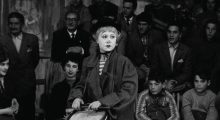Federico Fellini
-
Ulysses, La Strada and Popeye: Jim Hemphill’s Home Video Recommendations, Holiday Edition

One of the more interesting periods in the history of Italian cinema is the era of international co-productions that followed neorealism; kicked off by the massive success of MGM’s 1951 extravaganza Quo Vadis, the Italian film industry entered a boom age in which the location shooting, social consciousness, and limited resources of neorealism gave way to spectacular sets, glamorous Hollywood stars, and lavish budgets thanks to the country’s abundance of breathtaking scenery and attractive production incentives. One of the most expensive and entertaining of the 1950s historical epics was Ulysses (1954), a gorgeously photographed and cleverly written adaptation of Homer’s […]
by Jim Hemphill on Nov 25, 2020 -
Watch: 16mm Behind-the-Scenes Footage of Fellini Directing Amarcord

It’s not clear where this video uploaded by Eyes on Cinema derives from, and there’s no English subtitles, but here’s eight-plus minutes of rare footage of Federico Fellini directing 1974’s Amarcord. There’s fake snow to be packed together and set up, a typically Felliniesque array walking through it (a priest, a nun and a bull) and lots of Fellini slowly and decisively delivering directions on set.
by Filmmaker Staff on Mar 23, 2015 -
From the Archives: Mike Kelley Interviews Harmony Korine
Mike Kelley, who passed away this month, contributed to Filmmaker once, in 1997, when he interviewed Harmony Korine about Korine’s debut feature, Gummo. From our archives, here is that interview. With a poetic, impressionistic take on film narrative, a visual style incorporating everything from elegantly framed 35mm to the skuzziest of home camcorder footage, and a startling mixture of teen tragedy, vaudeville humor, and sensationalist imagery, Harmony Korine’s first feature Gummo is perhaps the only recent film whose artistic strategies draw as much from visual art as the film world. (A gallery installation of work from Gummo opens at L.A.’s […]
by Filmmaker Staff on Feb 13, 2012 -
SCORSESE AND VON TRIER OR SCORSESE, DE NIRO & FELLINI?
We’ve kinda been down this road before. In early 2010, around the time of the Berlin Film Festival, reports rumors hit the blogsphere that Lars von Trier, Martin Scorsese and Robert De Niro were planning a remake of Taxi Driver in the vein of The Five Obstructions by making it five times, each with rules created by von Trier. Now out of Cannes, Scorsese and von Trier are bringing up the idea again. According to The Hollywood Reporter, the Scorsese project to be dissected has not been decided yet but shooting will begin after Scorsese is done with the Daniel […]
by Jason Guerrasio on May 13, 2011 -
The Perfect Swan
(Editor’s Note: This essay contains spoilers.) In literature or in oratory, where rhetoric arose from, it’s somewhat difficult to separate the argument’s mode of persuasion from its substance. In order to make an entirely skilled rhetorical point, the writer or speaker will have to present a series of assumptions and assertions, facts and hypotheses, in such a way that makes the argument’s substance apparent. That’s why literature lends itself to the intellectual: it’s founded upon a progression of ideas. Cinema is often referred to as a different kind of linguistic medium (the “language of film”), but a linguistic one nevertheless, […]
by Zachary Wigon on Dec 10, 2010
